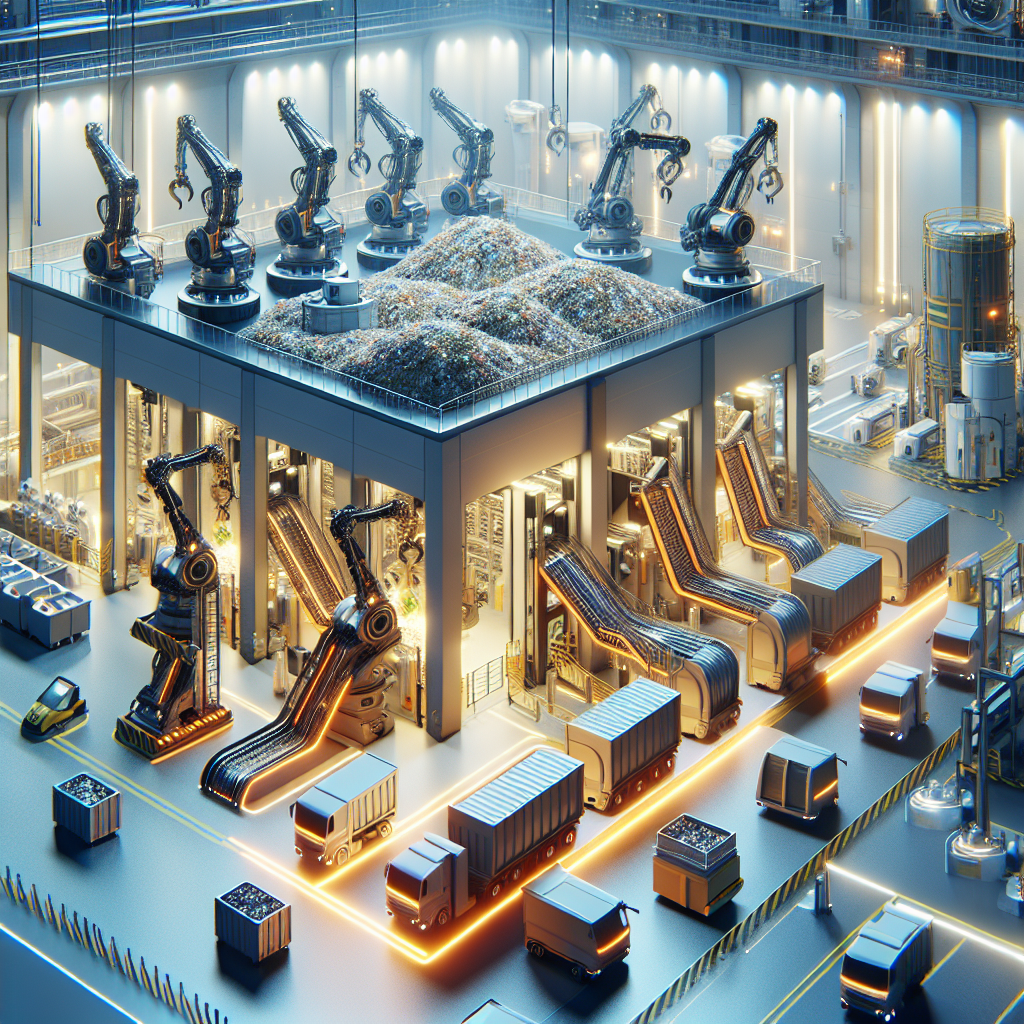AI and Consumer Decision-Making
Artificial Intelligence (AI) is increasingly playing a pivotal role in shaping consumer decision-making processes, particularly concerning sustainable choices. By leveraging vast amounts of data, AI systems provide consumers with personalized recommendations that align with their values and preferences. This technology not only enhances consumer awareness but also empowers them to make informed decisions that prioritize sustainability.
One of the key ways AI influences decision-making is through predictive analytics. AI algorithms analyze past purchasing behaviors and predict future preferences, thus enabling retailers to offer products that are more aligned with eco-friendly practices. This approach not only caters to the evolving demands of conscious consumers but also encourages companies to adopt sustainable practices. Below is a table illustrating the impact of AI-driven recommendations on sustainable product purchases:
| Year | AI-Driven Sustainable Purchases (%) | Traditional Purchases (%) |
|---|---|---|
| 2020 | 35 | 65 |
| 2021 | 45 | 55 |
| 2022 | 55 | 45 |
Furthermore, AI-powered tools such as virtual assistants and chatbots play a crucial role in consumer education. These tools provide instant information and feedback on the environmental impact of various products, helping consumers to make choices that are more aligned with their sustainability goals. For instance, a virtual assistant might suggest eco-friendly alternatives or provide data on a product’s carbon footprint.
In summary, AI not only assists in refining consumer decision-making processes by offering personalized and sustainable choices but also encourages a broader adoption of eco-friendly habits. As AI technology continues to evolve, its ability to influence consumer behavior towards sustainability will likely become even more pronounced, driving significant positive change in consumption patterns globally.
Personalized Sustainable Recommendations
In the realm of sustainable consumer behavior, artificial intelligence plays a pivotal role by offering personalized recommendations that align with individual values and environmental goals. By leveraging vast datasets and sophisticated algorithms, AI systems can analyze consumer preferences and behaviors to suggest eco-friendly products and services. These recommendations not only enhance consumer satisfaction but also contribute significantly to reducing the ecological footprint of consumption.
AI-driven platforms utilize machine learning techniques to continuously refine their understanding of what constitutes sustainable choices for different consumers. This is achieved through the analysis of purchasing patterns, as well as the environmental impact of various products. By integrating data from multiple sources, AI can identify trends and provide tailored suggestions that encourage consumers to opt for greener alternatives. For instance, an AI system might recommend locally-sourced produce to a consumer who frequently buys groceries, thus supporting local farmers and reducing carbon emissions associated with long-distance transportation.
- Data Analysis: AI systems assess vast amounts of data to identify sustainable options.
- Consumer Preferences: Personalized recommendations are based on individual behavior and values.
- Impact Reduction: Suggestions aim to minimize the environmental impact of consumer choices.
The impact of these personalized recommendations is further amplified through data visualization techniques that clearly demonstrate the benefits of sustainable choices. For example, a visual comparison of the carbon footprint of various products can empower consumers to make more informed decisions. These visual aids help consumers quickly grasp the long-term environmental benefits of their choices, thereby fostering a greater sense of responsibility and engagement in sustainable practices. Moreover, AI can facilitate the creation of interactive dashboards that allow consumers to track their sustainability journey, providing motivation and insights into how small changes in behavior can lead to substantial environmental benefits over time.
| Feature | Benefit |
|---|---|
| Personalized Recommendations | Align consumer choices with sustainable practices. |
| Data Visualization | Enhances understanding of environmental impact. |
| Interactive Dashboards | Encourages ongoing sustainable behavior. |
AI in Reducing Waste
Artificial Intelligence (AI) plays a significant role in minimizing waste, fundamentally transforming how businesses and consumers approach sustainability. By leveraging AI technologies, companies can optimize supply chains, predict demand accurately, and minimize overproduction, which substantially reduces waste. For instance, machine learning algorithms can analyze historical sales data to forecast future demand, thereby aligning production schedules with actual market needs.
One of the most effective applications of AI in waste reduction is in the food industry. AI systems can monitor inventory levels in real-time and suggest optimal ordering quantities to prevent overstocking and spoilage. Moreover, AI-powered applications can analyze consumer purchasing patterns and adjust inventory levels accordingly, ensuring that food products are fresh and consumed before expiration. The following table highlights key benefits of AI in reducing waste:
| AI Application | Benefit |
|---|---|
| Demand Forecasting | Reduces overproduction |
| Inventory Management | Prevents spoilage |
| Consumer Pattern Analysis | Optimizes stock levels |
Additionally, AI technologies are instrumental in waste sorting and recycling processes. Advanced AI systems equipped with computer vision can identify and sort recyclable materials more efficiently than traditional methods. This not only increases the recycling rate but also reduces contamination in recycling streams. By automating these processes, AI helps in achieving higher purity levels of recyclable materials, which is essential for creating a more sustainable recycling industry.
In conclusion, the integration of AI in waste management strategies offers a promising pathway towards achieving sustainable consumption. By enhancing logistical efficiencies and enabling smarter decision-making, AI contributes significantly to reducing environmental impact. As AI technology continues to advance, its potential in driving sustainable practices will likely expand, paving the way for a more eco-conscious society.
AI-Driven Energy Efficiency
AI-driven energy efficiency is becoming a cornerstone in the quest to enhance sustainable consumer behavior. By leveraging advanced algorithms and machine learning, AI systems can optimize energy consumption both at the individual and industrial levels. For instance, smart home devices can learn from user habits and adjust energy usage patterns to minimize waste. This not only reduces utility bills for consumers but also significantly contributes to reducing the overall carbon footprint.
One of the key areas where AI is making a substantial impact is in smart grid technology. AI algorithms can analyze vast amounts of data from various sensors and predict energy demand patterns with high accuracy. This leads to better load management and reduces the need for excess energy production, which often relies on non-renewable resources. Utilities can use this data to optimize energy distribution, ensuring that energy is used more efficiently and sustainably.
| Benefits of AI in Energy Efficiency | Examples |
|---|---|
| Optimized Energy Consumption | Smart thermostats that learn user preferences |
| Enhanced Predictive Maintenance | AI-powered diagnostics in industrial machines |
| Reduced Carbon Footprint | Improved energy distribution in smart grids |
Furthermore, AI’s role in energy efficiency extends beyond the household. In industrial settings, AI technologies can monitor machinery and predict when maintenance is needed, thus preventing energy loss due to equipment failure. This predictive maintenance not only improves operational efficiency but also prolongs the lifespan of machinery, contributing to sustainability goals. Together, these AI-driven innovations are pivotal in promoting eco-friendly practices and encouraging a shift towards more sustainable energy consumption behaviors.
Sustainable Supply Chains through AI
Artificial Intelligence (AI) is revolutionizing supply chains by introducing innovative methods to enhance sustainability. Through advanced algorithms and machine learning, AI can analyze vast amounts of data to optimize logistics, reduce emissions, and minimize waste. One of the primary ways AI contributes to sustainable supply chains is by improving demand forecasting. By accurately predicting consumer demand, companies can adjust their production schedules, leading to less overproduction and waste.
Moreover, AI technologies facilitate the creation of more transparent and traceable supply chains. Utilizing AI-powered tools, companies can track the journey of materials from sourcing to final delivery. This transparency allows consumers and businesses to ensure that ethical practices are maintained throughout the supply chain. Additionally, AI can identify inefficiencies or unethical practices, enabling companies to address these issues proactively.
| AI Application | Impact on Sustainability |
|---|---|
| Demand Forecasting | Reduces overproduction and waste |
| Supply Chain Transparency | Ensures ethical practices and traceability |
AI also aids in the optimization of transportation routes, which can significantly reduce carbon footprints. By analyzing traffic patterns, weather conditions, and fuel consumption data, AI systems can suggest the most efficient routes for transporting goods. This optimization not only decreases greenhouse gas emissions but also reduces transportation costs for companies.
- Improved logistics planning
- Reduction in fuel consumption
- Lowered transportation costs
Overall, the integration of AI into supply chain management is a critical step towards achieving more sustainable consumer behavior. By leveraging AI, companies can not only enhance their sustainability efforts but also gain a competitive advantage in an increasingly eco-conscious market.
AI in Sustainable Product Design
Artificial intelligence is revolutionizing the way products are designed with sustainability in mind. By integrating AI technologies, companies are able to create products that are not only more efficient but also environmentally friendly. AI-driven design tools allow designers to simulate various materials and production processes, predicting their environmental impact before manufacturing even begins. This predictive capability helps in selecting materials that are sustainable and processes that minimize waste.
One of the key areas where AI contributes is in material selection. AI algorithms can analyze vast datasets to identify sustainable materials that meet specific design requirements. For instance, AI can compare the carbon footprint of different materials, helping designers choose options that reduce environmental impact. This capability is illustrated in the table below, which shows a comparison of materials based on their sustainability scores:
| Material | Carbon Footprint (kg CO2/kg) | Sustainability Score |
|---|---|---|
| Recycled Aluminum | 4.0 | 8.5 |
| Bamboo | 1.5 | 9.0 |
| Virgin Plastic | 6.0 | 4.0 |
Moreover, AI aids in optimizing the design for manufacturability. By analyzing design parameters, AI can suggest modifications that lead to more efficient production methods, reducing energy consumption and waste generation. This optimization often involves a combination of strategies, including:
- Reducing material usage through efficient design.
- Streamlining production processes to minimize energy use.
- Enhancing product durability to extend lifecycle.
Overall, AI’s role in sustainable product design is pivotal in advancing eco-friendly initiatives. By leveraging AI, companies not only align with environmental goals but also enhance their market competitiveness through innovative and sustainable product offerings.
AI and Consumer Education
Artificial intelligence (AI) plays a pivotal role in educating consumers about sustainability. By leveraging data analytics and machine learning, AI systems can tailor educational content to individual preferences, making learning about sustainable practices more engaging and accessible. These systems analyze consumer behavior and provide personalized recommendations that encourage environmentally friendly choices.
One of the most significant ways AI contributes to consumer education is through interactive platforms and applications. These platforms utilize AI algorithms to offer users insights into their consumption patterns and suggest actionable steps to reduce their carbon footprint. For instance, a mobile app might analyze a user’s purchasing habits and suggest more sustainable alternatives or provide feedback on their progress toward eco-friendly goals.
The following table summarizes key AI-driven tools that enhance consumer education on sustainability:
| Tool | Description | Impact |
|---|---|---|
| Smart Shopping Assistants | AI-powered assistants that recommend sustainable products based on user preferences. | Increases awareness and adoption of eco-friendly products. |
| Eco-Footprint Calculators | Applications that calculate and track the environmental impact of consumer habits. | Educates users on their environmental impact and motivates behavioral changes. |
| Virtual Learning Platforms | Interactive platforms offering courses on sustainability topics. | Enhances knowledge and skills for sustainable living. |
AI not only educates but also empowers consumers by providing the necessary tools to make informed decisions. This empowerment is crucial in driving a collective shift towards sustainability. As AI continues to evolve, its potential to further transform consumer education and promote sustainable behavior will undoubtedly expand, paving the way for a more environmentally conscious society.
AI-Enhanced Recycling Initiatives
Artificial Intelligence is significantly advancing recycling initiatives by optimizing sorting and processing systems. Traditional recycling methods often struggle with contamination and inefficiency, leading to substantial waste. However, AI technologies, such as machine learning and computer vision, are now being implemented to improve the accuracy and speed of sorting recyclable materials. For instance, AI-powered robots can quickly identify and separate various types of waste, significantly reducing human error and improving the purity of recycled materials. This not only enhances the overall efficiency of recycling plants but also increases the amount of materials that can be successfully recycled.
Another major contribution of AI in recycling is predictive analytics, which helps in managing waste collection and processing more effectively. By analyzing data on waste generation patterns, AI systems can predict peak waste times and optimize collection routes. This leads to reduced fuel consumption and lower emissions, aligning with eco-friendly goals. Additionally, AI can provide insights into consumer recycling habits, enabling municipalities and businesses to tailor their recycling programs to encourage better participation and reduce contamination.
AI is also facilitating the development of new materials that are easier to recycle. Through simulations and modeling, AI can help scientists design materials with properties that allow for easier breakdown and reprocessing. This innovation is crucial in creating a circular economy where products are continuously reused, significantly reducing reliance on virgin resources. Furthermore, AI-driven platforms are emerging to connect consumers with recycling services, providing information on how to properly dispose of items and locate nearby recycling facilities.
| AI Technology | Application in Recycling | Impact |
|---|---|---|
| Machine Learning | Optimizing Sorting Systems | Increased Efficiency and Reduced Contamination |
| Predictive Analytics | Waste Collection Optimization | Lower Emissions and Fuel Consumption |
| Material Simulation | Design of Recyclable Materials | Facilitation of Circular Economy |
Ethical Considerations in AI Use
The integration of artificial intelligence into sustainable consumer behavior raises several ethical considerations. Privacy concerns are at the forefront, as AI systems often rely on collecting and analyzing vast amounts of personal data to provide personalized recommendations. Consumers may be unaware of how their data is being used, potentially leading to a breach of trust. It is crucial for companies to implement transparent data policies and ensure that consumers have control over their personal information.
Another significant ethical issue is the risk of bias in AI algorithms. AI systems can inadvertently perpetuate existing inequalities if they are trained on biased data sets. This can result in unfair treatment of certain consumer groups, undermining efforts to promote sustainability. To address this, companies must prioritize diversity and inclusivity in their data collection and algorithm development processes. Regular audits and updates of AI systems can help identify and mitigate biases.
Moreover, the deployment of AI in enhancing eco-friendly initiatives must be balanced against the potential environmental impact of AI technologies themselves. The energy consumption required for training and operating AI systems can be substantial, contributing to carbon emissions. Organizations should consider the environmental footprint of their AI solutions, opting for energy-efficient technologies and sustainable practices in their deployment.
| Ethical Consideration | Description |
|---|---|
| Privacy | Ensuring consumer data is used transparently and with consent. |
| Bias | Preventing unfair treatment by addressing algorithmic bias. |
| Environmental Impact | Minimizing the carbon footprint of AI technologies. |
Future Prospects of AI in Sustainability
Artificial Intelligence (AI) is poised to play a pivotal role in advancing sustainability efforts as we look toward the future. One of the key areas where AI is expected to make a significant impact is in optimizing resource management. By analyzing vast amounts of data, AI can help identify patterns and predict future resource needs, thus enabling more efficient use of natural resources. This predictive capability can lead to substantial reductions in waste and promote more sustainable consumption patterns.
Furthermore, AI-driven technologies are likely to enhance the effectiveness of recycling programs. Through the use of smart sorting systems that employ machine learning algorithms, recycling facilities can significantly improve the sorting accuracy of materials, thereby increasing the overall efficiency of recycling processes. This not only helps in conserving resources but also in reducing the carbon footprint associated with waste management. The integration of AI in these processes is expected to revolutionize how communities manage waste and recycling, ultimately leading to a more circular economy.
Another promising prospect is the role of AI in fostering sustainable consumer behavior through personalized recommendations. As AI systems become more sophisticated, they can provide consumers with tailored suggestions on sustainable products and practices. This approach can be further illustrated through the following table, which highlights potential AI applications in consumer behavior:
| AI Application | Impact on Consumer Behavior |
|---|---|
| Personalized Eco-Friendly Product Recommendations | Encourages consumers to choose sustainable products by providing tailored suggestions based on purchasing habits. |
| Smart Home Energy Management Systems | Reduces energy consumption by optimizing home appliance usage according to real-time data analysis. |
In conclusion, the future prospects of AI in sustainability are vast and varied. By leveraging advanced technologies to promote efficient resource use, improve recycling processes, and encourage eco-friendly consumer choices, AI holds the potential to significantly enhance sustainable practices and contribute to a greener planet.



